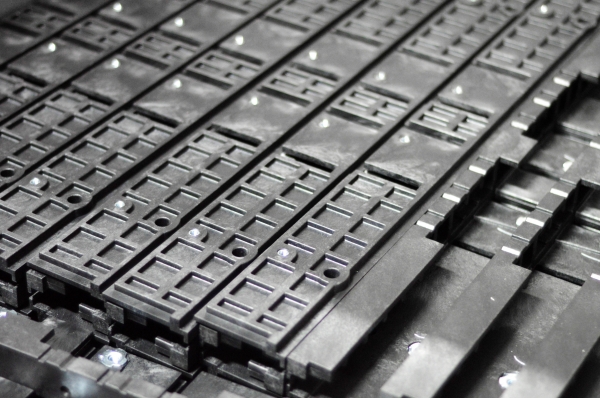Insert Injection Molding

Insert injection molding is the process of molding or forming plastic parts around other, non-plastic parts, or inserts. The inserted component is most commonly a simple object, such as a thread or rod, but in some cases, inserts can be as complex as a battery or motor.
Moreover, Insert Molding combines metal and plastics, or multiple combinations of materials and components into a single unit. The process makes use of engineering plastics for improved wear resistance, tensile strength and weight reduction as well as using metallic materials for strength and conductivity.
Insert Molding Process
Lomont utilizes advanced quality molding machines that are explicitly designed for the insert injection molding process. The insert molding process necessitates extremely tight tolerances to ensure the proper formation of the plastic parts being created. The slightest misalignment of even a fraction of a millimeter can lead to the ultimate failure of the molding process. Our state-of-the-art insert molding equipment can meet your most exacting specifications.
Insert Injection Molding Benefits
Metal inserts and bushings are commonly used for reinforcing the mechanical properties of the plastic parts or thermoplastic elastomer products that are created through the insert injection molding process. Insert molding provides a number of benefits that will improve your company’s processes all the way down to its bottom line. Some of the benefits of insert injection molding, include:
- Improves component reliability
- Improved strength & structure
- Reduces assembly and labor costs
- Reduces the size & weight of the part
- Enhanced design flexibility
Insert Injection Materials
Our insert injection molding machines and advanced quality equipment enable us to quickly adapt to the constant advancements throughout our industry. Improvements in polymer technologies and molding processes have opened doors to new and exciting products and processes. We welcome these advances, as we strive to provide our customers with the most up-to-date, insert molding options available. The insert injection materials that we offer can be used in most thermoplastics.
Applications & Uses for Plastic Injection Inserts
Insert molding metal inserts are derived directly from insert injection materials and are regularly used in a wide range of industries including: aerospace, medical, defense, electronics, industrial and consumer markets. The applications for metal inserts for plastic parts, include:
- Screws
- Studs
- Contacts
- Clips
- Spring contacts
- Pins
- Surface mount pads
- And more
Insert Injection Molding vs Overmolding
Insert molding and overmolding are two distinctly different processes that produce their own unique types of products. The overmolding process takes place when one material is overmolded over a second material. The base layer is molded first and the additional plastic layer(s) are molded over and around the original part. This results in a single finished product. Overmolding creates a strong finished product with long service life and enhanced safety features.
Conversely, insert injection molding occurs when insert injection materials are injected into the mold cavity prior to plastic injection molding. The resulting product is a single piece with the insert encapsulated by the plastic. Plastic injection inserts provide a fast and cost-effective assembly process, producing parts with reduced size and weight.
Insert Molding Considerations
Lomont’s experienced staff are experts at the insert injection molding process. They have the capabilities to take insert injection materials and create plastic injection inserts from those materials. However, there are certain factors that should be considered before making a final decision regarding the insert molding process. The insert molding costs must be weighed, including the insert and tooling costs. The inserts themselves also need to be able to withstand the injection molding process, as some pressures and temperatures can damage them. Other considerations that should be factored, include:
- Means to hold the insert during the molding process
- Bosses or undercuts that provide additional retention strength within the molded part
- Understanding which specific components and technologies are combined into a single component within the insert injection molding process
Contact Lomont Today
Contact us for more information regarding our insert injection molding capabilities for creating plastic parts and metal inserts, or request a quote today.







